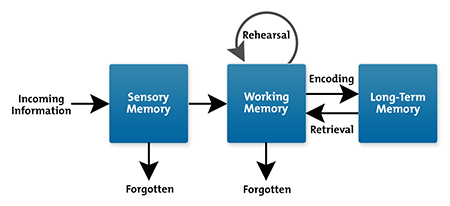Put in its most simple terms cognitive load theory states that our brains have a limited working memory that can only process small amounts of new information from our environment. If we overload this working memory we are not going to be able to process it and therefore the new information will be forgotten.
 |
| A simple model of memory. The working memory is the part that we don't want to overload! |
 |
| If we have overloaded our students working memory chances are nothing was ever learnt in the first place. |
 |
| Willingham's simple model of the mind. |
General strategies could be:
- When starting new concepts teach slow, accelerate later.
- Consider the knowledge you want students to remember in each learning episode.
- Use explanation strategies that avoid overloading working memory and encourage connections with prior knowledge.
- Tie any new learning to knowledge already in the long term memory.
- Integrate retrieval practice strategies routinely into lessons to enhance student access to knowledge stored in the long term memory.
- The take home strategy (as demonstrated by Adam Boxer).
- Knowledge organisers
- Interleaving and spacing
- Routine low stakes retrieval practice (including homework)
- Explanation strategies e.g. dual coding/direct instruction/worked examples.
Cognitive load theory and applications:
- https://achemicalorthodoxy.wordpress.com/2018/10/25/simplifying-cognitive-load-theory/
- https://classteaching.wordpress.com/2019/02/27/cognitive-load-theory-what-to-do/
- https://www.cese.nsw.gov.au/images/stories/PDF/Cognitive_load_theory_practice_guide_AA.pdf
- https://twitter.com/impactwales/status/979024960059510784
- https://classteaching.wordpress.com/2018/09/14/using-knowledge-organisers-to-improve-retrieval-practice/
- https://my.chartered.college/2019/05/organising-knowledge-the-purpose-and-pedagogy-of-knowledge-organisers/
- https://www.teachwire.net/news/why-every-teacher-should-use-knowledge-organisers
- https://www.teachwire.net/news/how-to-create-the-perfect-knowledge-organiser
- https://twitter.com/olicav/status/1180547009255804929
- https://lovetoteach87.com/2019/05/02/examples-of-dual-coding-in-the-classroom/
- https://www.olicav.com/
- @olicav
Explanation techniques (based on understanding of CLT):
- https://teachreal.wordpress.com/2018/09/19/reclaiming-chalk-and-talk/amp/?__twitter_impression=true
- @EnserMark
- @atharby
Hope you find this helpful!
Ian Stonnell @DenbighCPD
Ian Hayden @IanHayden8
No comments:
Post a Comment